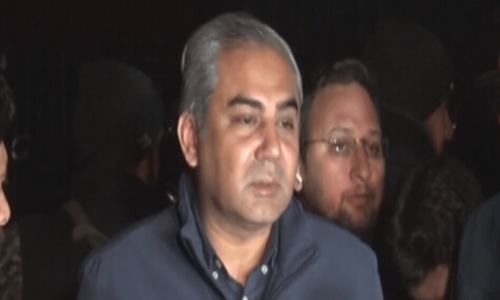PESHAWAR: A Peshawar High Court bench on Wednesday decided to constitute a special bench for hearing a petition challenging the grant of bail to 25 convicts in Mashal Khan lynching case by the Abbottabad bench earlier this year.
Chief Justice Waqar Ahmad Seth and Justice Mussarat Hilali heard preliminary arguments by Barrister Amirullah Khan Chamkani, lawyer for Mashal’s father Iqbal Khan, on the bail cancellation petition and announced that a special bench would hear the petition on Sept 14.
The bench observed that the special bench would decide whether the bail granted to the convicts by the high court could be recalled by the same court under the Anti-Terrorism Act.
On Feb 27, a high court bench had heard applications for the suspension of sentences and grant of bail to 25 convicts.
Court observes bench to see whether bail can be recalled
The applications were filed in the criminal appeals of the convicts challenging their conviction by an anti-terrorism court on Feb 7.
Mashal Khan, a 23-year-old student of the Department of Mass Communication at the Abdul Wali Khan University, Mardan, was lynched by a mob over the allegation of blasphemy on Apr 13, 2017.
The anti-terrorism court, which conducted the trial of the lynching case inside the Haripur Central prison, had convicted 31 of the accused and acquitted the remaining 26.
The 25 convicts, who were released on bail, were sentenced by the trial court to three years rigorous imprisonment each under Section 11-WW (lynching) of the Anti-Terrorism Act, 1997, with a fine of Rs50,000 each.
They were also sentenced to one-year imprisonment each with fine of Rs50,000 under section 297 (indignity to human corpse), section 148 (rioting) and section 149 (unlawful assembly) of Pakistan Penal Code (PPC).
The trial court had ruled that the sentences would run concurrently.
Barrister Amirullah Chamkani said while the Code of Criminal Procedure (CrPC) had empowered an appellate court to suspend a sentence and set free a convict on bail, the Anti-Terrorism Act in clear terms provide that the appellate court shall not release the accused on bail.
He said under Section 25(8) of the ATA, the accused won’t get bail until the high court decided their appeal.
The lawyer added that the ATA was a special law and therefore, it should prevail over other laws.
He said the appellate court had erred in releasing 25 convicts on bail as it didn’t follow the law.
The lawyer said under its appellate jurisdiction, the high court is not empowered to suspend a sentence awarded under the ATA and to release a convict on bail.
Before the high court’s appellate bench in Abbottabad, the counsel for 25 convicts had contended that as their clients’ sentences were short, they should be released on bail after suspension of their sentences until the final disposal of their appeal.
Currently, several appeals of the convicts and the provincial government and Iqbal Khan’s against acquittal of the accused and award of nominal sentence to several of them are pending with the high court.
Published in Dawn, September 6th, 2018













































Dear visitor, the comments section is undergoing an overhaul and will return soon.